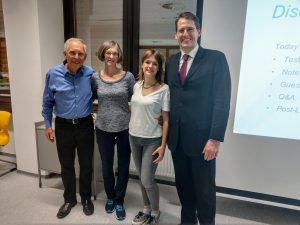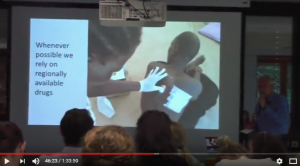We recently had a life-changing event at the medical school of one of our partner universities in Vienna. Dr. Peter Pollack was our guest lecturer. A small, pleasent man who became a doctor at age 59 and has since done missions in Syria, Sudan, Sierra Leone, and other war-torn regions as an emergency room physician, shared with us his own powerful life-changing story. His wife came along too and helped us understand from the other side of family in danger zones. The presentation was enough to challenge the entire room to think in new ways by answering the question “What is a Doctor Without Border?”

Bringing Meaning to Life
The various ways that Doctors Without Borders (Medecins Sans Frontieres – MSF hereafter) helps both Doctors and Patients might surprise you. What surprised me the most about Dr. Pollack’s lecture was not the fact that he went to medical school at age 59, but how the opportunity structure built by MSF gave Dr. Pollack the space and need to fulfill his dream, which was clear even to an outside observer: to give back in the most efficient way possible for those with the greatest need he could imagine. This dream is not Pollack’s alone, but the property of us all as we age, the known substance of our faith in the wisdom of years and the transition of our spirits to the next generation. Dr. Pollack is just an example of how the life-changing medicine of MSF not only heals the taker, but also the giver.
But there is another, greater meaning of life that MSF gives and it is the most obvious: MSF saves children and supports life-saving medicine. What is the importance of life? Of every single living human being? Can we exclude some groups from life? Those are the peering questions that both Dr. Pollack and the mere presence of MSF in the medical school brought to the audience of young doctor students, and that sit as reminders every day of our shared value of helping the vulnerable, especially the sick, and thinking critically in order to achieve the best solutions for these global – and increasingly local – populations.
What connects us to Medecins Sans Frontieres? Values
Some of the values that Dr. Pollack espoused and modelled are heard throughout progressive modern thought and for MSF labelled “independent humanitarian assistance” which is:
- based on need
- irrespective of race, religion, gender, or political affiliation
- guided by medical ethics
- the principles of independence and impartiality
These progressive values can confront certain cultures and areas where MSF works, and MSF is known to speak out on issues such as acts of extreme violence, when medical facilities come under threat, and when delivery of life-saving medical supply deliveries are hindered. One of the things we learned is that the adoption of a set of values shared by the participating doctors is enough to satisfy the requirements of the people in need of support, even if the people on the ground would prefer otherwise. In this vein, students were led to think critically about their own somewhate progressive values in relation to competing structures and belief systems. Also, taking impartial and independent decisions was seen as the only way an organization like MSF can work in so many places, to date as Dr. Pollack showed, having consulted with already 9 million outpatients across 70 countries.
Medecins Sans Frontieres Helps with Health Innovations
Although finding meaning in life and living according to your beliefs in medicine sounds extraordinary, what really stuck in this presentation and about MSF is their lean and practical innovative health solutions, especially when there are no hospitals or supplies to use, in other words “resource scarce” environments.

One of these health innovations is sugar. On the slide it read “Whenever possible we rely on regionally available drugs.” This principle of course seems logical – but only after experiencing the difficulty of buying, transporting, and administering drugs from outside sources, or hearing about it through convincing examples, like this one where Dr. Pollack challenged the audience with the question “what can be put into bullet wounds?” to which one student hollered out “salt” to which Dr. Pollack replied “I think you’d be in trouble if you put salt in that guy’s wound!” the Answer: Sugar. And he’s right – medical school and knowledge of medicine alone will not save lives in resource-scarce environments, and doctors must rely on knowledge of context and think critically to find immediate solutions.
 And yet another MSF innovation is a simple candy bar. Dr. Pollack called this the “Plumpy Nut” bar and said they taste pretty good – and pack 500 calories of nutrition. One of the most memorable statistics the class learned in the course section and video on malnutrition was that 50% of children in the world die before the age of five. This number is largely due to malnutrition, which is unthinkable to our modernized societies but a fact that should make each one of us pause and critically reflect on what direction we are headed and how fast. When resources are scarce and malnutrition has set in, it is time to think critically about survival. That criticality turns into lean creativity and broader understanding of the problem in the case of MSF: on the one hand this low-cost temporary fix can prevent a child from dying, but on the other there are longer-term issues that remain in need of more comprehensive solutions.
And yet another MSF innovation is a simple candy bar. Dr. Pollack called this the “Plumpy Nut” bar and said they taste pretty good – and pack 500 calories of nutrition. One of the most memorable statistics the class learned in the course section and video on malnutrition was that 50% of children in the world die before the age of five. This number is largely due to malnutrition, which is unthinkable to our modernized societies but a fact that should make each one of us pause and critically reflect on what direction we are headed and how fast. When resources are scarce and malnutrition has set in, it is time to think critically about survival. That criticality turns into lean creativity and broader understanding of the problem in the case of MSF: on the one hand this low-cost temporary fix can prevent a child from dying, but on the other there are longer-term issues that remain in need of more comprehensive solutions.
The session ended with a Q&A for Dr. Pollack’s wife, who both supported the mid-life change that her husband undertook as well as his choice to go to the places most dangerous even for doctors. The fact that Doctors Without Borders exists gives us hope that the next generation of medical doctors will have something to work towards, both as doctors and as supporters of quality of life for all, as innovators and as activists, as those who bring meaning to people’s lives – including their own – through their life-saving work around the world and inside the human soul.
Watch the entire video here:
Donate to Medecins Sans Frontieres: http://www.msf.org/
Learn more about the Advanced Language Institute’s University and FH Level Medicine Courses: www.advancedlanguageinstitute.com/medicine







